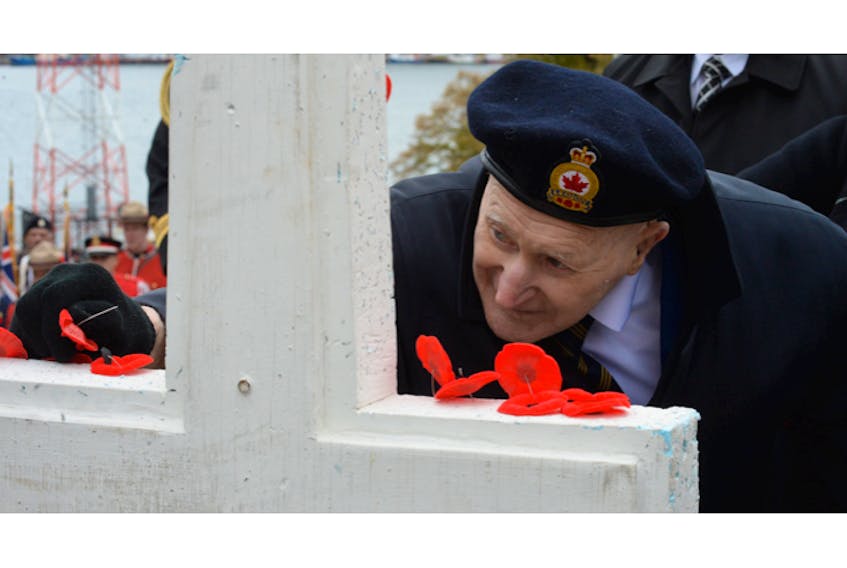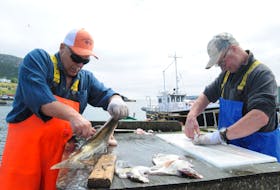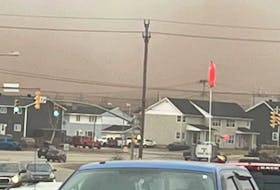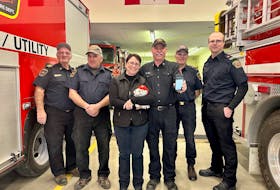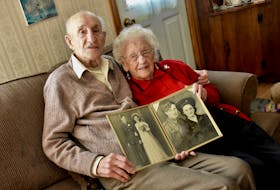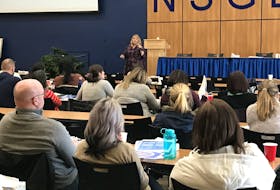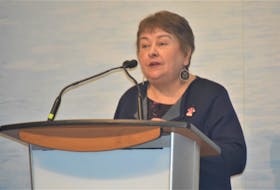ST. JOHN'S, N.L. — Two small children bundled in winter jackets and mittens sat quietly on the grass below the War Memorial in Downtown St. John’s, among the thousands gathered Monday for the Remembrance Day ceremony.
As they sat silently for two minutes, the children clung to fallen leaves and looked up at the veterans, service-people and dignitaries gathered near the memorial.
Flags flapped in the cool wind.
Seagulls flew overhead.
This year’s ceremony marked the first since the Newfoundland National War Memorial was designated a Canadian National Historic Site in August.

On Monday, among those gathered around it was the Spragg family.
“He’s an awesome dad,” smiled Noah Spragg as he looked at his father, retired Master Warrant Officer Richard Spragg.
“I’m proud of him for all he’s done for everyone.”
Spragg served in the Canadian Armed Forces for 33 years, beginning in the infantry and moving to the air force.
He wears five medals: a Campaign Star for two tours in Afghanistan, a medal for four years in Germany, a Canadian Peacekeeping Service Medal for service in Cyprus, a medal for serving two tours in Italy during conflict in Libya and a Canadian Forces' Decoration.
“It’s a time to reflect,” Spragg said.
“I did some veteran speaking tours at schools, and I used to say to the kids, ‘It’s not just about the soldiers, it’s actually about the men and women who stayed behind and the sacrifices they made, too.’ Now it’s remembering those, and making sure it’s not forgotten.”
‘Peace don’t come cheap’: D-Day veteran
Charlie Starkes sat adjacent the War Memorial during the ceremony with the Singing Legionnaires, a group he has sang with since it was formed in 1967.

At 97, Starkes is one of the few remaining Second World War veterans.
“He has a cold, and his doctor told him not to go out too much in the cold weather, but he’s here today,” said Kevin Fisher, a fellow member of the choral group.
Starkes was 22 and a torpedo-man on the Royal Navy aircraft carrier HMS Tracker during D-Day, June 6, 1944.
He helped fit the fighter planes with munitions before they lifted off the deck as part of Operation Overlord — the massive invasion that turned the tide to end the war in Europe.
When the war ended, Starkes remained overseas for six months, clearing beaches of land mines — dangerous work that paid an extra 20 cents a day.
Asked what he thought about during the ceremony on Monday, Starkes said he can’t think of too much, “Or I starts to cry.”
He said he hopes younger generations never have to witness the same atrocities.
“I hope they never have to go overseas because it don’t make sense because it’s almost as bad now as it was before,” he said, referring to ongoing conflicts around the world.
“Peace don’t come cheap, you know. Millions of people lose their lives. It’s an awful price to pay for an argument, and that’s mostly what it is.”
Twitter: @juanitamercer_

